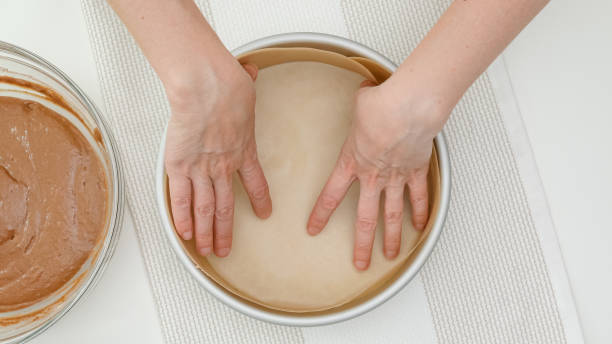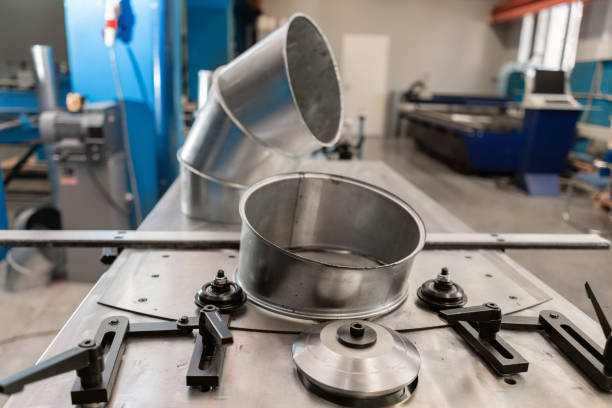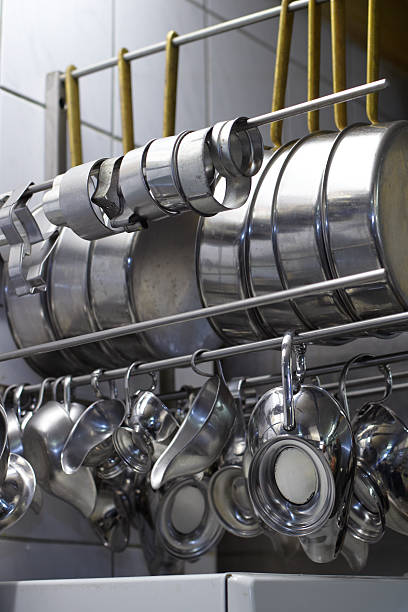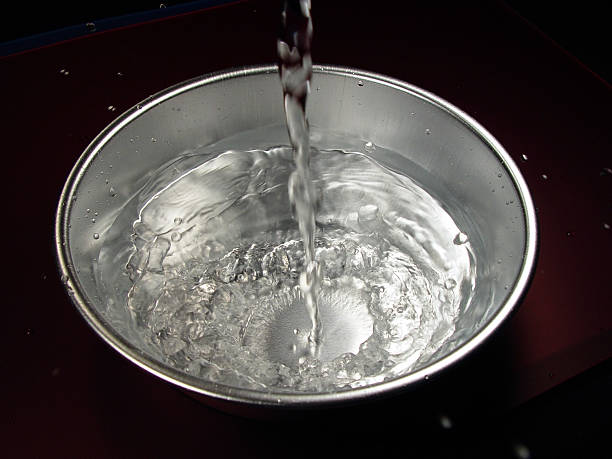Aluminium cookware manufacturers produce a wide range of products that cater to the diverse needs of home cooks and professional chefs alike. They offer traditional pots and pans, as well as innovative products that incorporate cutting-edge technology to make cooking faster and easier.
One of the main advantages of aluminium cookware is its lightweight yet durable construction. This makes it easy to handle, especially for those who may have difficulty lifting heavier cookware. Additionally, aluminium is a good conductor of heat, which means it heats up quickly and distributes heat evenly across the surface of the cookware. This is particularly important when cooking foods that require precise temperature control, such as sauces or delicate dishes.
Another advantage of aluminium cookware is its affordability compared to other metals used for cookware, such as stainless steel or copper. This makes it an accessible choice for home cooks who want to invest in high-quality cookware without breaking the bank.
Aluminium is also non-corrosive and won't react with acidic foods, which is important for dishes that require long cooking times or high heat levels. This makes it an ideal choice for dishes like tomato-based sauces or braised meats, which can cause other metals to corrode or react negatively.
Some of the leading aluminium cookware manufacturers on the market today include T-fal, Calphalon, Circulon, and All-Clad. Each of these companies offers a range of products that are designed to meet the needs of different types of cooks, from beginner home cooks to professional chefs.
Overall, aluminium cookware is a popular choice for its durability, even heat distribution, and affordability. With so many manufacturers producing high-quality aluminium cookware, there's something out there for everyone, regardless of their cooking experience or preferences.
Blog Series: A Beginner's Guide for Best Aluminium Cookware Manufacturer

The Benefits Of Aluminium Cookware
Aluminium cookware is a popular choice among chefs and home cooks for several reasons. Here are some of the benefits of using aluminium cookware:
1.Lightweight: Aluminium is a lightweight material, which makes it easy to handle and use. You can easily move your aluminium cookware around the kitchen without straining your arms or hands.
2.Durable: Aluminium cookware is incredibly durable and long-lasting. It doesn't rust or warp like other materials, making it a great investment for your kitchen. With proper care, aluminium cookware can last for many years.
3.Heat distribution: Aluminium is an excellent heat conductor, which means that it distributes heat evenly across the surface of the pan. This makes it easier to cook food evenly and quickly. You won't have to worry about hot spots or uneven cooking with aluminium cookware.
4.Energy-efficient: Because aluminium is a good conductor of heat, it absorbs heat more efficiently than other metals. This means that you can use lower temperatures when cooking with aluminium cookware, which can save energy and reduce your cooking time.
5.Easy to clean: Aluminium cookware is easy to clean and maintain. It doesn't stain or discolor easily, and you can usually clean it with soap and water. You can also put it in the dishwasher for easy cleaning.
6.Versatile: Aluminium cookware comes in a range of sizes and shapes, so you can find a pot or pan that's perfect for your cooking needs. You can use it for everything from sautéing vegetables to frying eggs to making soups and stews.
7.Affordable: Aluminium cookware is generally more affordable than other types of cookware, such as stainless steel or copper. This makes it a great choice for anyone on a budget who still wants high-quality cookware.
Overall, aluminium cookware is an excellent choice for anyone who wants durable, efficient, and versatile cookware that's easy to clean and maintain.
Blog Series: A Beginner's Guide for Is Aluminum Baking Pan Safe

The Different Types Of Aluminium Cookware
Aluminium cookware is a versatile and affordable option that has become a staple in many kitchens. Here are some of the most common types of aluminium cookware:
Skillets: These are shallow, wide pans with sloping sides that are perfect for sautéing and frying. They come in a range of sizes, from small to large, and are often used for cooking eggs, meat, and vegetables.
Sauce Pans: These are deep pots with a flat bottom and high sides, often with a lid. They are ideal for cooking soups, stews, sauces, and pasta. They come in different sizes and capacities, from small to large.
Woks: These are large, bowl-shaped pans with high, sloping sides that are perfect for stir-frying, steaming, and deep-frying. They come with a lid, and some models have a flat bottom that can be used on a stove.
Stockpots: These are large, deep pots with a flat bottom and high sides, often with a lid. They are ideal for cooking large batches of soup, stew, or chili. They come in different sizes, from small to large.
Steamers: These are pots with a perforated basket that fits inside, allowing you to steam vegetables, seafood, and dumplings. They are usually made of stainless steel or aluminium and come in different sizes.
Double Boilers: These are pots with two nested pans, one on top of the other. The bottom pan is filled with water, while the top pan holds the food. They are used for melting chocolate, making custards, and cooking delicate sauces.
When choosing aluminium cookware, it's important to consider the quality of the material, the thickness of the metal, and the type of coating or non-stick surface. High-quality aluminium cookware is durable, heats evenly, and is easy to clean. It's also important to choose cookware that is compatible with your cooking surface, whether it's gas, electric, or induction. With so many options available, you're sure to find the perfect aluminium cookware for your cooking needs.

The Manufacturing Process Of Aluminium Cookware
Aluminium cookware is a popular choice for cooking utensils due to its high thermal conductivity, which allows for efficient and even heating. The manufacturing process of aluminium cookware involves several steps, as described below:
Melting: The first step in the manufacturing process is melting the raw material, aluminium. This is typically done in a large furnace, where the aluminium is heated to high temperatures until it reaches a liquid state.
Shaping: Once the aluminium has melted, it is shaped into the desired shapes for the cookware. This is typically done using a die-casting process, where the liquid aluminium is poured into molds that are shaped like the final product.
Cooling and Sandblasting: After the shaping process, the pieces are then cooled to room temperature, and any excess material is removed through sandblasting. This gives the cookware a smooth and polished finish.
Anodizing: Anodizing is a process where an oxide layer is added to the surface of the aluminium, making it harder and more durable. This process also helps to increase corrosion resistance and provides a uniform colour finish.
Coating: The final step in the manufacturing process is applying a non-stick or enamel coating to the cookware. This coating helps to increase the durability of the cookware and makes it easier to clean. Non-stick coatings are typically made from materials like Teflon, while enamel coatings are made from a combination of glass and ceramic.
Quality Control: Before the cookware is packaged and shipped out to stores around the world, it undergoes rigorous quality control testing. This ensures that only high-quality cookware reaches consumers that will last them many years.
In conclusion, the manufacturing process of aluminium cookware involves several steps to ensure that only high-quality and durable cookware reaches consumers. From melting and shaping the raw material to adding anodizing and coating, each step plays a crucial role in creating cookware that is efficient, durable, and easy to use.
Blog Series: A Beginner's Guide for The Best Place to Buy Baking Supplies

The Role Of Aluminium Cookware Manufacturers
Aluminium cookware manufacturers are responsible for the production of aluminium cookware, from the sourcing of raw materials to the creation of the finished product. These manufacturers play a crucial role in ensuring that the cookware is produced according to safety standards and customer specifications.
The process of manufacturing aluminium cookware involves several stages, including melting, casting, forging, stamping, and finishing. The manufacturers are responsible for ensuring that each stage is completed safely and efficiently. They must also ensure that the finished product meets the necessary safety and quality standards.
In addition to ensuring safety and quality, manufacturers must also consider consumer trends when designing their products. This includes researching existing products, understanding customer feedback, and adapting designs accordingly. By doing so, they can create products that are more appealing to consumers and meet their evolving needs.
To stay competitive, manufacturers must also stay up-to-date on new technologies and processes that can improve production efficiency and quality. This includes using new materials, such as non-stick coatings, and incorporating automation into the production process.
Manufacturers must also ensure that their production processes are completed safely and ethically. This includes protecting workers from harm, ensuring that the environment is not damaged, and complying with all relevant laws and regulations.
In summary, the role of aluminium cookware manufacturers is to ensure that the cookware they produce is of high quality, safe, and meets consumer needs. They must also stay up-to-date with new technologies and processes, and ensure that their production processes are completed safely and ethically. By doing so, they can create products that provide long-term value for consumers.

The Future Of Aluminium Cookware Manufacturer
Aluminium cookware is a popular choice for both professional and home chefs due to its durability, lightweight, and affordability. The material conducts heat well, allowing for even cooking and preventing hot spots, and it is also easy to clean and maintain.
In recent years, there has been a focus on making aluminium cookware more eco-friendly and sustainable. Some manufacturers are using recycled aluminium to reduce waste, while others are creating non-toxic and non-stick coatings that are free from harmful chemicals.
One of the major advantages of aluminium cookware is its versatility. It can be used on all types of stovetops, including gas, electric, and induction, and can also be used in the oven or on the grill. With more options available in terms of size and design, cooks can easily find just the right pieces to suit their needs.
In addition to its practicality, aluminium cookware also has a timeless appeal. Its classic look fits in with any kitchen decor and it is often passed down from generation to generation. This longevity makes it a sustainable choice for those looking to reduce waste and invest in long-lasting kitchen tools.
In conclusion, the future of aluminium cookware is bright. Manufacturers are constantly innovating and improving their products to make them more sustainable and eco-friendly. With its versatility, affordability, and durability, it is sure to remain a staple in kitchens around the world for many years to come.

Conclusion Of Aluminium Cookware Manufacturer
Aluminium cookware has gained immense popularity among home cooks due to its many benefits. One of its key advantages is its lightweight nature, which makes it easy to handle and maneuver in the kitchen. Additionally, aluminium is highly durable and can withstand high temperatures without warping or cracking, making it a great option for everyday use.
The manufacturing process of aluminium cookware is highly specialized, which means that choosing the right manufacturer is crucial to ensure that you get a high-quality product that meets your needs. It's important to look for a manufacturer with a reputation for producing durable and reliable cookware that's built to last.
As the popularity of aluminium cookware continues to grow, manufacturers are constantly innovating and creating new products with even greater functionality and style. This means that there are now more options available than ever before, with a range of designs, sizes, and features to choose from.
Ultimately, as a consumer, it's important to make an informed decision when selecting your aluminium cookware. This involves considering factors such as your cooking needs, budget, and preferences when it comes to design and features. By doing your research and choosing a reputable manufacturer, you can be confident that you'll get a product that will serve you well for years to come.
Blog Series: A Beginner's Guide for Baking Supply Manufacturers
